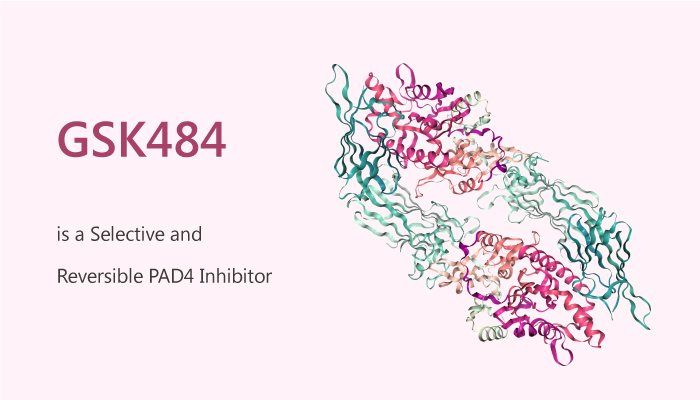Citrullination of arginine residues, catalyzed by five closely-related protein arginine deiminases (PADs 1-4 and PAD6), affects numerous physiological and pathological processes. Multiple tumors over-express PAD4, and it affects p53 function and downstream clearance pathways. PAD4 is also linked to diseases characterized by aberrant levels of neutrophil extracellular traps (NETs). Neutrophils from PAD4-deficient mice lack NETs and the mice show increased susceptibility to infection. Thus, they suggesting that PAD4 and NETs are critical in innate immunity. In both histone citrullination and neutrophil extracellular trap formation, the selective PAD4 inhibitors binding to a calcium-deficient form of the PAD4 enzyme have validated the critical enzymatic role of human and mouse PAD4. In this study, GSK199 and GSK484 as the first inhibitors with a strong preference for PAD4 over other family members. GSK484 is a selective and potent PAD4 inhibitor.

GSK484 demonstrates high-affinity binding to PAD4 with IC50s of 50 nM in the absence of Calcium. Pre-treatment with 10 µM GSK484 dramatically diminished citrullination and NET formation. Moreover, it has IC50s of 50 nM and 250 nM in the absence of Calcium (0 mM) and Calcium (2 mM), respectively. GSK484 also inhibits PAD4 citrullination of benzoyl-arginine ethyl ester (BAEE) substrate in a concentration-dependent manner. In addition, GSK484 at a dose of 4 mg/kg daily during one week reverts signs of kidney dysfunction in tumor-bearing mice to the same extent as DNase I treatment. Furthermore, it does not show any detectable signs of toxicity.
In summary, GSK484 is now available to unlock the complex biology of NETosis. It represents potential therapeutic interventions against devastating NET diseases.
Reference:
Lewis HD, et al. Nat Chem Biol. 2015 Mar;11(3):189-91.
Cedervall J, et al. Oncoimmunology. 2017 Apr 20;6(8):e1320009.